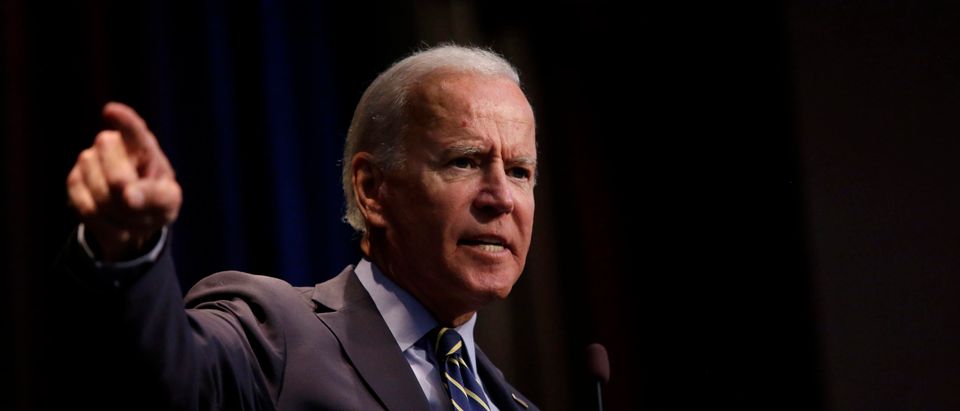Editor’s note: We endeavor to bring you the top voices on current events representing a range of perspectives. Below is a column arguing that President Joe Biden has used the Defense Production Act the same way other presidents have. You can find a counterpoint here, where John Hostettler argues that Biden has misused the Defense Production Act.
It has not been a good spring for President Joe Biden. COVID is still with us. Inflation is unchecked. Violent crime is rampant. Our southern border is out-of-control. Baby formula has disappeared from too many grocery shelves.
Most of these issues are unlikely to be resolved by this fall’s midterm elections, and the GOP will surely make each shortcoming a reason why Republicans should regain control of Congress.
What’s a president to do? Biden already has said that curbing inflation is beyond his control: he now blames Vladimir Putin for rising gasoline prices and supply-chain disruptions.
Seeking “bold action,” President Biden has invoked the 1950 Defense Production Act, a law based on World War II’s War Powers Act. Citing presidential authority under the DPA, Biden has issued presidential determinations authorizing the U.S. Department of Energy to “accelerate domestic production of five key energy technologies: (1) solar; (2) transformers and electric grid components; (3) heat pumps; (4) insulation; and (5) electrolyzers, fuel cells, and platinum group metals.”
Biden’s actions are legal and consistent with the DPA’s scope and purpose. Such authorizations are appropriate presidential tools to address critical national priorities. The most important issue, however, is not whether Biden has the authority but how he implements that authority.
Biden is not the first president to find the DPA a useful governing tool.
Former President Donald Trump railed against the DPA as harmful to American business, but he later invoked the law at least 80 times during the COVID pandemic to address the national shortage of K-95 masks and other critical medical supplies, like ventilators. Trump ordered General Motors to make ventilators and praised his own actions as “the greatest industrial mobilization since World War II.”
Biden has also invoked the DPA to speed vaccine production.
Energy Secretary Jennifer Granholm says Biden’s energy authorizations will enable the U.S. to “take ownership of its clean energy independence.” What on earth does this language mean? Granholm sounds more like an aspiring civil-society executive than a take-charge Cabinet secretary.
The White House “Fact Sheet” announcing Biden’s actions repeatedly labels his decision “bold action.” Well, actually, it’s not.
Invoking the DPA has now become relatively routine. According to The New York Times, the Department of Defense “on average, uses the law 300,000 times a year to ensure contractors prioritize government orders.” The Federal Emergency Management Agency, according to the Department of Homeland Security, has invoked it “more than a thousand times” to handle relief efforts after natural disasters, like hurricanes. The law has even been used in producing a new version of Air Force One.
A careful reading of the White House “Fact Sheet” reveals a hidden agenda in the president’s actions. Biden’s “bold action” will “create a bridge to this American-made clean energy future.” Building this bridge will mean “[r]educing America’s dependence on gas and oil” as a matter of U.S. national security, according to Deputy Secretary of Defense Secretary Kathleen Hicks.
There’s not a single reference to managing a clean-energy transition that also entails ramping up existing fossil-fuel capabilities today to address rising gasoline and natural gas needs that cannot be met in the near future by existing green energy resources. That approach would require Biden to cease waging war against America’s fossil-fuel industry. Meanwhile, Americans are advised to anticipate rolling electricity blackouts this summer.
Read closely the White House’s implementation details: “the Biden-Harris Administration will strongly encourage the use of strong labor standards, including project-labor agreements and community benefits agreements that offer wages at or above the prevailing rate and include local hire provisions.”
Might this approach herald yet another administration sop to organized labor?
And then there’s language suggesting that the administration “will strongly encourage projects with environmental justice outcomes that empower the clean energy transition in low-income communities historically overburdened by legacy pollution.” Will diversity, equity, and inclusion standards now be applied to this procurement process?
Rather than unleash America’s innate competitive capability to get things done, Biden’s approach resembles a typical nonprofit-sector grant announcement. Both the White House and the Department of Energy “will convene relevant industry, labor, environmental justice, and other key stakeholders” in the implementation process.
Bottom line: we can expect red tape, costly delays and more failed Solyndra-type solar-panel investments that characterized the Obama-Biden administration.
If Republicans win back the Congress this fall, a top priority must be immediate and continuing oversight of the Biden administration’s DPA procurements. American taxpayers should expect nothing less.
Charles Kolb served as Deputy Assistant to the President for Domestic Policy from 1990-1992 in the George H.W. Bush White House


